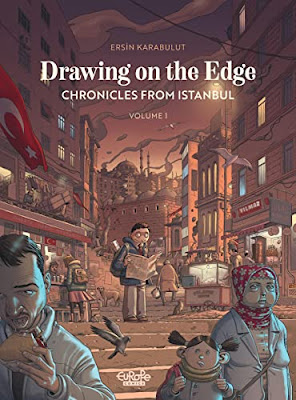It turns out Erdogan and Turkey’s Islamists do not have much of a sense of humor. What a surprise, right? Of course, that rather complicates life for cartoonists like Ersin Karabulut. This was a rather disappointing turn of events for him and his humorist colleagues, because they had been so critical of the military’s prohibitions against the veil and other such secular regulations. Those in power were never happy with Karabulut and his fellow cartoonists, but none of their previous targets consolidated political power as effectively as Recep Tayyip Erdogan. Although only 41, Karabulut has already satirized plenty of national turmoil, which he revisits in his graphic novel, Drawing on the Edge.
Karabulut grew up in the working-class suburbs of Istanbul with his Kemalist family. That meant they were secularists, who embraced Ataturk’s progressive vision for Turkish society. Unfortunately, even in Karabulut’s youth, secularism was starting to give way to re-invigorated Islamism, especially the authoritarian brand advocated by Erdogan. At that point, the military could still be counted on to step in to counter their power grabs, but things like coups were a bad look, especially to Karabulut’s idols at Turkish humor magazines. Basically, they are, or at least they were a lot like Mad Magazine, but more ideologically focused.
For Karabulut’s risk-averse father, these magazines were not an acceptable place of employment. Yet, he still started selling them cartoons, because they represented the lion’s share of the market for freelance work. In retrospect, he came to understand why his father was so spooked by politics, especially when a shadowy gang of mullahs starts dogging his steps.
Edge vividly illustrates the erosion of liberties under Erdogan, culminating with a full-scale assault of press freedoms, when the autocrat sues the staff of Karabulut’s magazine for depicting his as various animals—a case that eerily parallels the Danish Jyllands-Posten cartoon fatwa and the criticism of Charlie Hebdo (which led to the tragic terrorist attack), in terms of its perceived slights and offenses. He also incisively contrasts Erdogan’s remarks on democratic practices intended for international audiences with those delivered to his Islamist supporters.
While Karabulut delights in presenting himself in a goofy cartoony way (in keeping with his love for the medium), he depicts his family and colleagues in a manner that reflects the seriousness of the issues and circumstances they had to navigate. Edge is obviously a comic-lover’s graphic novel, but it vividly captures the realities of contemporary Turkish history. There is whimsy and humor in it, but it is still an urgent story that shines a light on Erdogan’s escalating attacks on freedom of expression. Very highly recommended for the art and the message, Drawing on the Edge is now available digitally from Europe Comics.
